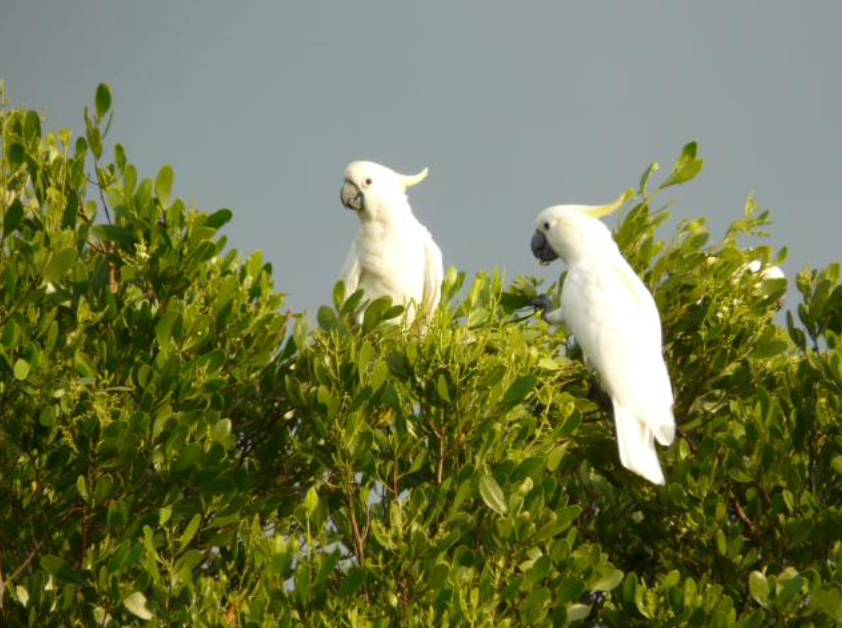Tracing Bugis ethnicity through the existence of yellow-crested cockatoo in Masakambing Island, Indonesia
DOI:
https://doi.org/10.31947/etnosia.v7i2.23410Keywords:
Buginesse, Masakambing, Ethnographic, Sulawesi, CockatooAbstract
Masakambing Island has administratively located in the District of Masalembu, Sumenep Regency, East Java province, Indonesia. This island is an endemic habitat for the yellow-crested cockatoo sub-species abbotti (Cacatua sulphurea abbotti). This research aims to discover the history of the people inhabiting Masakambing island and traces of Bugis culture through the existence of the yellow-crested cockatoo. The study was conducted using a qualitative method with an ethnographic design. The study results show that the origin people who inhabited this island were from the Bugis ethnic group. The local name Beka' reflects how the yellow-crested cockatoo is very close to Bugis culture on Masakambing island. Besides, the Bugis ethnic who inhabit Sulawesi island is familiar with the yellow-crested cockatoo, sub-species sulphurea, and djampea. The existence of yellow-crested cockatoos on Masakambing island still triggers questions because the location of Masakambing island is outside the Wallace line, which is not common to find families of parrots such as yellow-crested cockatoos.Downloads
References
Armstrong, M., Kimmerer, R. W., & Vergun, J. (2007). Education and research opportunities for traditional ecological knowledge. Frontiers in Ecology and the Environment, 5(4), W12–W14. https://doi.org/10.1890/1540-9295(2007)5[w12:EAROFT]2.0.CO;2
Asfar, A. M. I. T., Asfar, A. M. I. A., & Nurannisa, A. (2021). Integration of Local Traditions Bugis-Makassarese: Learning Strategies to Improve Mathematical Communication Skills. IOP Conference Series: Earth and Environmental Science, 1808(1). https://doi.org/10.1088/1742-6596/1808/1/012064
Bandung, T. (2020). Budaya Bugis Dan Persebarannya Dalam Perspektif Antropologi Budaya. Lensa Budaya: Jurnal Ilmiah Ilmu-Ilmu Budaya, 15(1), 27–36.
Berkes, F., Colding, J., & Folke, C. (2000). Rediscovery of Traditional Ecological Knowledge as Adaptive Management. Ecological Applications, 10(5), 1251–1262. https://doi.org/10.2307/2641280
Biró, É., Babai, D., Bódis, J., & Molnár, Z. (2014). Lack of knowledge or loss of knowledge? Traditional ecological knowledge of population dynamics of threatened plant species in East-Central Europe. Journal for Nature Conservation, 22(4), 318–325. https://doi.org/10.1016/j.jnc.2014.02.006
de Arruda, J. C., da Silva, C. J., Sander, N. L., & Pulido, M. T. (2018). Traditional ecological knowledge of fish fauna in quilombolas on the Alto Guaporé, Mato Grosso, Southern Amazonia, Brazil. Boletim Do Museu Paraense Emilio Goeldi:Ciencias Humanas, 13(2), 315–329. https://doi.org/10.1590/1981.81222018000200004
Desmita. (2014). Psikologi Perkembangan Peserta Didik. Remaja Rosdakarya.
Eldridge, K. A. (2016). An analysis of archaeofauna recovered from a Russian period camp on St. Paul Island, Pribilof Islands, Alaska. Arctic Anthropology, 53(2), 33–51. https://doi.org/10.3368/aa.53.2.33
Halupka-Rešetar, S., & Radić, B. (2003). Animal Names Used in Addressing People in Serbian. Journal of Pragmatics, 35(12), 1891–1902. https://doi.org/10.1016/S0378-2166(03)00052-3
Harris, J. B. C., Green, J. M. H., Prawiradilaga, D. M., Giam, X., Giyanto, Hikmatullah, D., Putra, C. A., & Wilcove, D. S. (2015). Using market data and expert opinion to identify overexploited species in the wild bird trade. Biological Conservation, 187, 51–60. https://doi.org/10.1016/j.biocon.2015.04.009
Hearn, K. P. (2021). Mapping the past: Using ethnography and local spatial knowledge to characterize the Duero River borderlands landscape. Journal of Rural Studies, 82(July 2020), 37–53. https://doi.org/10.1016/j.jrurstud.2021.01.024
Ihsannudin, I., Hidayat, K., Sukesi, K., & Yuliati, Y. (2020). Perception of the local community toward the yellow-crested cockatoo (Cacatua sulphurea abbotti), a critically endangered species in Masakambing Island, Indonesia. Malaysian Journal of Society and Space, 16(4), 1–14. https://doi.org/10.17576/geo-2020-1604-01
Iucnredlist. (2017). Cacatua Sulphurea. Www.Iucnredlist.Org.
Law, R. (2013). Ouidah as a Multiethnic Community. In J. Cañizares-Esguerra, M. D. Childs, & J. Sidbury (Eds.), The Black Urban Atlantic in the Age of the Slave Trad (pp. 42–62). niversity of Pennsylvania Press.
Majid Cooke, F., & Johari, S. (2019). Positioning of Murut and Bajau identities in state forest reserves and marine parks in Sabah, East Malaysia. Journal of Southeast Asian Studies, 50(1), 129–149. https://doi.org/10.1017/S0022463419000171
Musdaria, M. (2018). Prinsip-Prinsip Rumah Tradisional Bugis Dan Aplikasinya Terhadap Rumah Tanggap Banjir Di Makassar. A092-A100. https://doi.org/10.32315/sem.3.a092
Naing, N., & Hadi, K. (2020). Vernacular architecture of buginese: The concept of local-wisdom in constructing buildings based on human anatomy. International Review for Spatial Planning and Sustainable Development, 8(3), 1–15. https://doi.org/10.14246/irspsda.8.3_1
Nandika, D., Agustina, D., Metz, S., & Zimmer, B. (2013). Kakatua Langka Abbotti dan Kepulauan Masalembu. Konservasi Kakatua Indonesia – The Indonesian Parrot Project.
Oberholser, H. C. (1912). Birds Collected by Dr. W. Abbott on Various Island in The Java Sea. Proc U.S Nst. Mus, 42(1912), 533.
Purba, Y., & Lisanti. (2021). Copra processing issue of migrant farmers in tidal land of South Sumatra. In S. T, S. A, A. M, P. S.M, C. D, & R. R. (Eds.), 1st International Conference on Agriculture, Natural Resources, and Rural Development, ICANaRD 2021. IOP Publishing Ltd.
Rahim, A. R. (2011). Nilai-Nilai Utama Kebudayaan Bugis. Penerbit Ombak.
Reuleaux, A., Siregar, B. A., Collar, N. J., Mardiastuti, A., & Marsden, S. J. (2022). Productivity constraints on Citron-crested Cockatoos in a rich community of large hole-nesting birds. Avian Research, 13(March), 100015. https://doi.org/10.1016/j.avrs.2022.100015
Ridha, A. A. (2018). Task Commitment pada Mahasiswa Suku Bugis yang Merantau. Jurnal Psikologi, 45(1), 66–76. https://doi.org/10.22146/jpsi.31094
Rinaldo, R., & Guhin, J. (2022). How and Why Interviews Work: Ethnographic Interviews and Meso-level Public Culture. Sociological Methods and Research, 51(1), 34–67. https://doi.org/10.1177/0049124119882471
Sharma, H. L., & Sarkar, C. (2019). Ethnography research: an overview. July.
Subaidah, T., Muharrami, L. K., Rosidi, I., & Ahied, M. (2019). Analisis Kemampuan Literasi Sains Pada Aspek Konteks Dan Knowledge Menggunakan Cooperative Proplem Solving (Cps) Dengan Strategi Heuristik. Natural Science Education Research, 2(2), 113–122. https://doi.org/10.21107/nser.v2i2.6238
Viciana, H. (2021). Animal culture: But of which kind? Studies in History and Philosophy of Science, 90(November), 208–218. https://doi.org/10.1016/j.shpsa.2021.10.012
Whiten, A. (2011). The scope of culture in chimpanzees, humans and ancestral apes. Philosophical Transactions of the Royal Society B: Biological Sciences, 366(1567), 997–1007. https://doi.org/10.1098/rstb.2010.0334
Zid, M., & Sjaf, S. (2009). Sejarah Perkembangan Desa Bugis-Makassar Sulawesi Selatan. Jurnal Sejarah Lontar, 6(2), 38–53.

Downloads
Published
How to Cite
Issue
Section
License
Copyright (c) 2022 ETNOSIA : Jurnal Etnografi Indonesia

This work is licensed under a Creative Commons Attribution-NonCommercial 4.0 International License.















1.png)





